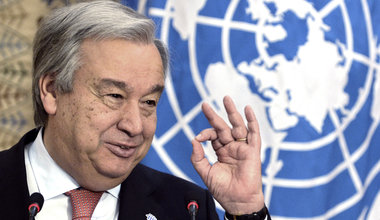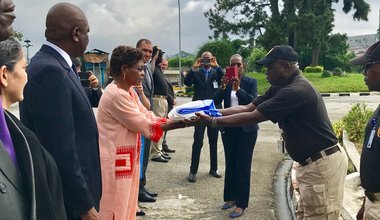Summary of UNOCI weekly press conference (11 August 2011)
DIGNITARIES FROM FORMER REGIME DID NOT SAY THEY WERE TORTURED, SAYS UNOCI HUMAN RIGHTS MISSION
None of the dignitaries from the former regime of ex-president Laurent Gbagbo, who were visited by the United Nations Operation in Côte d'Ivoire (UNOCI), in detention or under house arrest, complained of having been tortured, the acting chief of the Human Rights Division (HRD), Guillaume Ngefa, said in Abidjan on Thursday.
Speaking during UNOCI's weekly press conference, Mr. Ngefa gave an assessment of the conditions of detention of former president Gbagbo and officials from his regime. These conditions could still be improved, he added.
The team led by him went to Odienné, Boundiali, Korhogo and Bouna to meet with the detainees. He said that he had held discussions with Mr. and Mrs Gbagbo in Odienné and Korhogo, "on their conditions of detention, including access to information and their lawyers". He discussed the same issues with 25 detainees in Boundiali, seven in Bouna and five in Katiola. Some of the detainees are accused of "plotting against the state" and "economic crimes". The journalist, Hermann Aboua, presenter of the television programme Raison d'Etat, who has been charged and held in Agban Gendarmerie Camp in Abidjan since 21 July 2011, was also visited by UNOCI human rights officers.
According to Mr. Ngefa, the visits were made to ensure that the rights of the detainees were being respected and to assess their conditions of detention. "With regard to Mrs Gbagbo, who is under house arrest, I think her living conditions are good. We spoke at length with her and she is satisfied with her living conditions. We also spoke at length with the former president," he added.
Mr. Ngefa admitted that none of the detainees complained about being tortured or mistreated, adding that their living conditions were good except for the fact that they felt isolated. "We did have some concerns and their living conditions could be improved. So we are going to make the appropriate recommendations to the authorities concerned. In Bouna, the conditions did not really conform to the expected standards. When it rains for example, the walls become damp and there is a problem with the waterproofing. The hygiene conditions were also not as good as what we saw elsewhere," he explained.
The acting human rights chief also stated that the period between 11 July and 10 August, was marked by about 100 human rights violations, documented and verified by nine of the Mission's regional human rights offices, even though there had been some improvement in the security situation in Abidjan. "These violations included verified cases of summary executions, extrajudicial arrests and illegal detentions, the freeing of detainees after money is paid, cases of extortion and racketeering of which transport operators are the main victims," explained Mr. Ngefa.
He said that in the south of the country, the Division had documented 26 cases of summary executions, 85 cases of arbitrary arrests and illegal detention, and 11 cases of rape and female genital mutilation during several missions into the interior. "During the period under review, 26 people, including a 17-month-old child were summarily executed in Biéby (40 km from Azopé), Daobly/Ponan (120 km southwest of Duekoué), Doba (90 km north of San-Pedro), Guetuezon (42 km from Daloa), Guitrozon (5 km from Duekoué) and Yopougon. In addition, some eight mass graves were discovered around three schools in Yopougon, in Abidjan. The exact number of bodies buried in these mass graves have not been determined," said Mr. Ngefa.
Mr. Ngefa expressed his Division's concerns over a resurgence of violent confrontations between elements of the Forces republicaines de Côte d'Ivoire (FRCI) and youths in Ores-Krobou (39 km from Abidjan), Abadjin-Kouté (in Dabou), d'Abadjin-Doumé (10 km from Abidjan), Akoupé-Zeudji (30 km from Abidjan) and Biéby (40 km from Azopé). "These violent confrontations have resulted in serious human rights violations with regard to physical assaults, cruel, inhumane and degrading treatment, as well as deprivation of property".
He said that similar violations were committed against people from the Bété community in Nakiahio (108 km from Daloa). During these incidents, eight people, including five civilians, were shot. Members of the Bakwé, Attié and Ebrié, originally from San-Pedro, Akoupé and Dabou, as well as villagers in Ganon, Sikensi (145km from Abidjan) and Odienné were also victims of such attacks. Mr. Ngefa said that victims had complained of "intimidation, extortion, as well as denial of freedom of movement perpetrated by FRCI elements deployed in these localities".
He also condemned cases of female genital mutilation (FGM) with 11 cases documented by the Division across the country, but mainly in Duekoué.
With regard to the north, in areas like Odienné, Bouna, Bondoukou, Mr. Ngefa said there was routine human rights violations, such as racketeering and some cases of arbitrary arrests. These issues, he explained, were raised by the military, political and administrative authorities. "The FRCI are still in charge of certain duties which should be carried out by other state authorities, such as the collection of commercial taxes, mining, customs etc. FRCI elements are still playing a major role in resolving land disputes, despite the presence of the competent state authorities who are equipped to deal with such issues," said the acting director of the Division.
Mr. Ngefa said that the FRCI defended their actions by claiming it was the only way they could raise revenue, which was an indication that "they have no intention of stopping it". They even continue to deal with court, prison and economic issues, as well as civil cases. "In Korhogo, for example, the prison is not under the control of the judicial and penitentiary authorities. In Bouna, the absence of police officers and the judiciary adversely affects the running of the justice system. In addition, the only prison in Bouna has been exclusively reserved for the seven dignitaries from former president Gbagbo's regime. In the absence of other detention centres, lawbreaking is being resolved in a friendly way by the FRCI," Mr. Ngefa concluded.
However, he welcomed the positive advances made in improving the protection of children's rights with Côte d'Ivoire's ratification of the Optional Protocol to the Convention on the Rights of the Child, on the sale of children, child prostitution, and child pornography (May 2005). This means that "disciplinary, administrative and legal actions can be taken against FRCI elements found guilty of such crimes, to put an end to impunity".
Earlier, the UNOCI Spokesman, Hamadoun Touré, had informed journalists that the Special Representative of the United Nations Secretary-General for Côte d'Ivoire, Y.J. Choi, would be meeting with the Representative of the Facilitator of the Inter-Ivorian Dialogue, Boureima Badini, on Thursday, 11 August 2011, in Abidjan.
Mr. Touré said the two dignitaries discussed the latest developments in the Ivorian peace process. "In addition to the remaining tasks in the process, they will also talk about strengthening cooperation between the United Nations and the Facilitation in order to ensure the return of lasting peace in the country," he added.
With regard to the activities of the Mission's military force, the Spokesman said that they had carried out 1,216 ground and air patrols, during the past week. Her said that they also carried out mixed patrols with the FRCI with a view to increasing security in order to "reassure the population and contribute to improving the security situation throughout the country".
Mr. Touré once again expressed UNOCI's sympathy to Côte d'Ivoire following the accident in which a public transport bus crashed into the Ebrié Lagoon in Abidjan on 5 August 2011. As a mark of its empathy with Ivorians, UNOCI military and police helped local authorities evacuate the injured to hospital and transport the dead to the mortuary. "As soon UNOCI was alerted, it dispatched three ambulances, two boat patrols and a medical team to the scene of the accident to provide assistance".
In addition, UNOCI peacekeepers continued providing assistance to Ivorians by giving free medical treatment to 1,125 patients, and distributing 36,500 litres of potable water to those in need. They also provide a weekly supply of potable water to internally displaced persons based in a camp on the road to Dabou, 10 km from Abidjan.
The spokesman said that UNOCI was continued to help strengthen capacity among its national partners and was organising a sensitisation workshop for members of the Ivorian Youth Parliament on Friday, 12 August 2011, in this regard. The event, which will be held in the National Assembly, is part of activities to mark International Youth Day and "will encourage youths to improve their contribution to establishing a peaceful post-crisis environment," Mr. Touré explained.
Meanwhile, the Mission was continuing with its sensitisation campaign aimed at local communities, known as "ONUCI TOUR", and will be going to Kerekeni (Zanzan region) and Gagou (Nzi Comoé region) with the aim of encouraging local people to become involved in promoting the national reconciliation process. Mr. Touré said that "ONUCI Tour" was in fact due to go to the Belleville neighbourhood of Duékoué on Thursday, 11 August 2011.
The Spokesman also said that UNOCI will have a busy day on Friday, 12 August 2011. In collaboration with the Independent Electoral Commission (IEC) and the NGO Esperance-Vie, the Mission will head for Tiesso in the sous-préfecture of Kani (55 Km of Séguéla), while the Office in Divo organizes an identical activity in Datta, to 09 Km of Divo, on the promotion of social cohesion and peaceful electoral environment, the Spokesman added. In San Pedro the Mission will organise a sensitisation activity to promote peace and social cohesion on the theme: "After the post-electoral crisis, how can students contribute to the return of peace?"
Mr. Touré said that as part of its commitment to work hand in hand with Ivorian authorities, UNOCI will be in Niazaroko with the deputy prefect of Goudouko (Lakota) and FRCI officials on Wednesday, 17 August 2011, to promote national reconciliation. The aim of the activity is "to reassure the population of their security". Similar sensitization activities will be held in Blahou, in San Pedro on 18 August 2011.
The Spokesman also talked about sport as "a factor of peace and assembly", adding that it is within this framework that the 3rd company of Benin battalion (BENINBATT) will play against the FRCI in a football tournament for peace on 13 August 2011.
 ONU
ONU Nations Unies Maintien de la paix
Nations Unies Maintien de la paix



